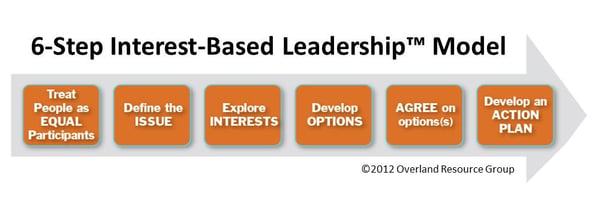Part 3 of 3 in an Interest-Based Leadership series
When I was in college, I earned my private pilot operator’s license. Learning to navigate a journey, control an aircraft for safety and comfort, and solve problems in the face of changing conditions can be complex and intimidating. As I reflect on this experience, the most important skill of a pilot was taught to me in the first 15 minutes of my inflight training experience.
I arrived at the small, rural airport before dawn. I was so excited to meet and impress my instructor. As I awaited his arrival, I studied the pre-flight checklist I had learned about in ground school. When my instructor arrived, we began our pre-flight checks. I did each check thoroughly from memory. I was so proud of myself. Then my learning began...
“I noticed you did not use your checklist during pre-flight,” said my instructor. I grinned broadly and proudly. “Don’t ever do that again,” he said. My pride quickly faded and I was humbled. What he went on to explain is a lesson that I used the rest of my life not only when flying but also as a leader:
Every pilot consults a checklist of actions needed before take-off. Pilots do not do this because they do not know how to fly the plane but because the situation is complex and potentially high risk. The tool is designed to insure that everything that is supposed to happen in fact happens – without a doubt. In the event of an emergency, the first thing a pilot pulls out is the emergency checklist, which outlines the most effective set and sequence of actions in a given situation. In this case, not only is the situation complex and high risk, the element of stress could impact the pilot’s performance. “No matter how many hours you log flying,” I can still hear that instructor saying, “don’t ever stop using your checklist.”
Little did I know at the time the impact of this learning on my future role as a leader. I have now come to understand how many critical and difficult conversations are necessary when one takes up the hefty responsibilities of leadership. Today, I never enter into a high stakes discussion without quite a bit of preparation and a checklist.
The checklist I have found most helpful with important conversations is one that helps assure I am following six repeatable action steps required for Interest-Based Leadership.
Here is how the Interest-Based Leadership Checklist works:
- Treating People as Equals helps assure participants come into the meeting feeling everyone is on equal ground. I pay attention to room set-up, body language and active listening.
- I focus on defining the core issue, not getting bogged down in peripheral issues, or reacting on emotion or past history. The key is to work from factual data and to avoid coming to pre-conceived solutions.
- Then I share my interests and encourage others to identify and express theirs. This critical step requires considering the outcomes we need, without jumping to solutions.
- Once we’re clear on Interests, we can explore a variety of options.
- After generating options, we look at those that meet the most shared interests, and ultimately, we agree on a direction.
- Then, it’s simply a matter of developing an action plan, and detailing who will do what by when to assure we act on the option we’ve agreed upon.
The interest-based process invariably results in better solutions that all parties end up wanting to support. The key to the consistent success is the checklist that lays out a series of steps that must be completed in order without skipping a step.
When I started my flying experience on a single engine aircraft, the preflight checklist seemed extraordinarily simple. As my experience grew and aircraft became more sophisticated, the checklist provided me with confidence and structure I needed to be successful. Similarly, the steps in the interest-based approach provide the appropriate actions and sequence necessary when dealing with difficult people or with high stakes issues.
Whether flying a complicated aircraft, or navigating a difficult conversation, I wouldn’t dream of doing either without my checklist. It’s quite literally a life saver.
Guest Blogger Vicki Kelsey is President, VKAL, Inc. She can be reached at v.kelsey@orginc.com. This blog series is based on previously published content in The OD Practitioner and used with permission from Nick Bizony, President, The Lakeland Group.



